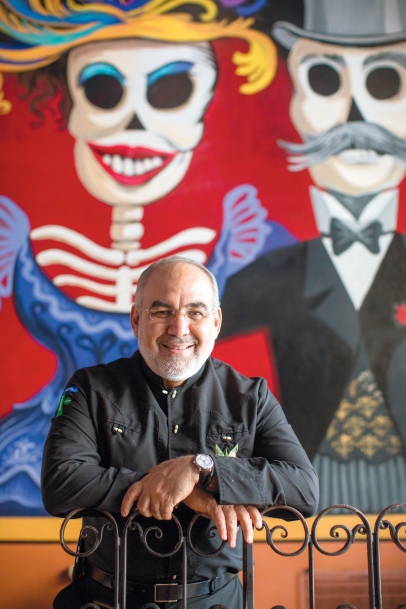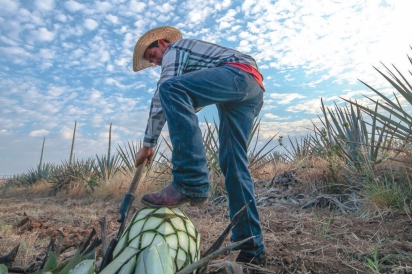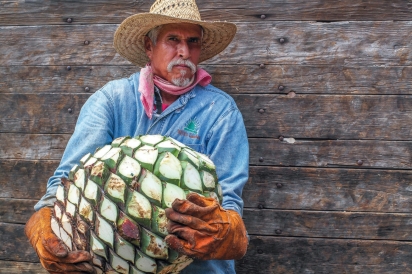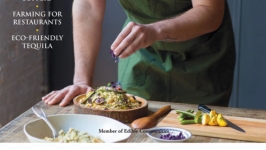Agave Advocate
Restaurateur David Suro-Piñera is on a mission to save tequila
This September, Philadelphia’s pioneering Mexican restaurant Tequilas will celebrate its 30th anniversary.
After reaching such an impressive milestone, many restaurateurs might put their retirement dreams into action, but owner David Suro-Piñera is not slowing down: He’s busy trying to preserve the future of the tequila industry.
In 2010, the Guadalajara native formed the nonprofit Tequila Interchange Project (TIP) with a group of bartenders and academics to promote traditional and responsible farming and increase consumer awareness of how the spirit gets made. According to Suro-Piñera, the cultivation of agave tequilana (blue agave), the succulent plant native to Mexico that’s used to make tequila, is under serious threat from production methods that are unsustainable socioeconomically and ecologically.
On the one hand, jimadores, the farmers whom Suro-Piñera calls “the doctors of the agave,” endure harsh working conditions and earn very low wages in a system plagued by unpredictable cycles of surplus and shortage. “Tequila is a very successful [spirits] category, but that doesn’t reflect on the farmers,” he says.
To make tequila the traditional way, the agave hearts, or piñas, must be harvested by hand using special techniques. Those techniques are often passed down through families, but the number of skilled jimadores is dwindling as many turn away from the fields to find other work in cities or in the United States.
Another major problem is agricultural. Rather than growing the plants from seed, farmers today use a cloning method where they replant identical offspring that grow alongside the mother plants. Over time, this approach has made the species highly susceptible to pests and disease.
“If you reproduce your agaves only by clones, you have an agave that is getting weaker every generation, genetically speaking,” says Suro- Piñera. He compares the situation to that of the common supermarket Cavendish banana, another clone scientists say is at risk of being wiped out because it lacks the genetic diversity to ward off blights.
Suro-Piñera contends that these two developments are forming a perfect storm that threatens the foundation of the agave industry. At the same time as the plants are becoming increasingly vulnerable, there are fewer skilled workers to take care of them during their very lengthy development period. (The plants take a minimum of five years to mature, sometimes many more.)
“The industry cannot afford to lose jimadores,” he warns. “That’s asking for trouble.”
Fortunately for tequila drinkers, Suro-Piñera, who travels to Mexico several times a year and has his own tequila and mezcal labels under the Siembra Spirits umbrella, is full of ideas about how to steer the industry toward more sustainable and ethical practices. His latest efforts include proposing a comprehensive study on jimadores’ working conditions, joining forces with ecologist Rodrigo Medellín to encourage bats to pollinate agave plants, as well as enlisting U.S. bartenders and consumers to effect change by asking questions about how their tequila is made and seeking out and buying sustainable spirits.
In addition to all his advocacy work, Suro-Piñera will launch a new Siembra Spirits product in late September to coincide with the restaurant’s anniversary. The project is something he’s been working on for about 25 years, but at press time details were still under wraps. “It has the potential to make very big waves in the agave spirits industry,” he says.
Studying the reality of the jimadores
Suro-Piñera says that before he and fellow TIP members can advocate successfully on behalf of the jimadores, they must have hard data on the farmers’ lives.
His colleague Sarah Bowen, a sociology professor at North Carolina State University and the author of Divided Spirits: Tequila, Mezcal, and the Politics of Production, conducted preliminary interviews with a small number of jimadores and found that their pay had not changed in the last 12 years, even when the price of agave had skyrocketed. The small farmers were not paid by the tequila companies directly, but rather through an intermediary, or cayote.
“Not only do they not get paid very much, but they also go long periods without work,” says Bowen. “They have a lot of health problems directly related to their work, and they don’t have health insurance or access to good health care.”
Suro-Piñera and Bowen are in the process of seeking funding for more comprehensive research, including in-depth interviews with a bigger group of jimadores and a large-scale survey of their work history, working conditions, wages, overall health and health insurance.
“The whole idea is to really have an objective vision of where we are as an industry and where the farmers are, and to try to figure out how we can improve their conditions,” says Suro-Piñera, who stresses that the intention is not to demonize the big transnational companies that control most tequila production today.
The industry is very complex, he explains, and the disconnect between agave farming and industrial tequila production goes back to the Mexican Revolution. “A lot of these companies, I don’t think they’re aware of how bad the conditions are for the farmers, because it’s been like this for many years,” he says.
“I’m not totally against the big producers,” Suro-Piñera clarifies.
“Thanks to them, tequila is what it is now. They have incredible marketing campaigns to reach every corner of the world, and that’s wonderful, but it has to be balanced.” He says that one way to achieve balance is to help to funnel some of the money consumers spend on tequila to the small producers and farmers who practice the centuries-old traditions that preserve the identity and soul of the industry.
According to Bowen, “The ultimate goal is to appeal to the tequila companies to help guarantee that the jimadores are being paid a reasonable wage, and there is a model for this with the tomato workers in Florida.” There, the Coalition of Immokalee Workers successfully appealed to restaurant chains and retailers to secure better working conditions and earn an extra penny a pound for the tomatoes they pick.
Bowen and Suro-Piñera say that the jimadores should be paid fairly not only because their work is labor-intensive and dangerous (they use sharp blades, or coas, to harvest the huge piñas), but also because the farmers play a critical role in determining the quality of the final product. They must be able to identify the agaves that are ready for harvest and then cut the leaves from the piñas according to the sugar content of each plant so that the tequila tastes balanced. “The way that they apply the cutting techniques can make or break a tequila,” Suro-Piñera says.
Bowen predicts that the effect on prices from an increase in jimador pay would be negligible to tequila drinkers in the United States. “Paying the jimadores a little bit more, something that would make a big difference to them, is not a lot of money to the consumer, because it’s a very small fraction of what goes into the cost of a bottle of tequila,” she says.
Partnering with the “Bat Man” of Mexico
Several times over the past 20 years, Rodrigo Medellín, a prominent Mexican ecologist and the subject of the BBC documentary The Bat Man of Mexico, has warned tequila industry officials about the dangers of overusing cloning to reproduce agave plants.
“I said, ‘You guys have 260 million plants that are clones of two individuals only, so you’re playing with fire here. All it takes is one disease to hit one plant and then all of your plants are going to be doomed,’” Medellín recalls.
But it wasn’t until he met Suro-Piñera through a mutual colleague a couple of years ago that he got any traction on his idea to encourage farmers to attract the lesser long-nose bat, agave’s natural pollinator, to their fields. “David and I hit it off right away, and we’ve been working together ever since,” says Medellín.
At a marathon session at table 13 in the Tequilas dining room, the two hatched a plan to combine Suro-Piñera’s industry connections with Medellín’s scientific expertise to launch a pilot program for mezcal and tequila producers to donate a portion of their agave plants for scientific research.
“For the past 200 years, the tequila industry has used clonal agaves to replant their fields,” explains Medellín. The farmers collect the baby agave offshoots that grow next to the mother plant and replant them, and when those plants grow offshoots they replant those. “Every generation, it’s reducing the genetic diversity,” says Medellín.
In order to continue the cycle, the farmers must prevent the agave from producing a quiote, the giant flowering stalk that sprouts up from the plant when it’s ready for its one-time reproduction at the end of its life. If they don’t cut the stalk, the sugars that have accumulated in the piña over the years will dry out and the plant will die.
“Allowing tequila agave to bloom is considered a waste because they cannot harvest it and produce tequila from it, so it’s unheard of, it’s unprecedented,” says Medellín.
But that flower at the top of the stalk is the bats’ food source and what allows them to distribute pollen among a variety of plants. “In a nutshell, bats are responsible for the genetic transmission between different agaves. You don’t have the bats, you don’t have that sexual reproduction,” says Medellín.
In the experimental “bat-friendly tequila” program developed by Medellín and Suro- Piñera, a handful of small mezcal and tequila producers have agreed to allow 5 percent of their plants to develop quiotes.
Medellín’s team monitors the fields for activity and collects pollen samples. He estimates that 5 percent of the plants in a one-hectare plot would feed about 100 bats.
“What bats do is, they will bring genetic diversity from other plants—and that is your safety net to avoid losing genetic diversity,” he explains.
If the program is a success, Medellín and Suro-Piñera hope to scale it up in the future and allow more producers to earn a “bat-friendly tequila” distinction. “I want the consumer to be educated about the fact that we owe tequila to the bats, we owe mezcal to the bats,” says Medellín, “and therefore their appreciation of the bats comes up a notch or two.”
The role of U.S. consumers
Bats are just one of the many issues Suro-Piñera and his friends at TIP want bartenders and tequila drinkers to have on their minds. Over the years, the group has lobbied against Mexican legislation it deemed potentially damaging to traditional agave spirits production, including the recently proposed standard Norma Oficial Mexicana 199, which would restrict the use of the terms agave and maguey to agave distillates produced within established Denominations of Origin. TIP contends that this would have disastrous consequences for small producers outside of those boundaries, who would be forced to label their products under the generic category komil (a Nahuatl word that means “intoxicating drink”), without identifying the main ingredient or production method.
Bowen realized the extent of TIP’s influence when the people she interviewed in Mexico stressed how valuable consumers are in advocating for change. “TIP has shown the importance of the role of consumers and bartenders and retailers, especially in the U.S. and in Mexico,” she says. Until there’s comprehensive data on the wages and working conditions of jimadores, Bowen suggests that consumers ask about how the people who make their tequila and mezcal are paid. “When consumers ask questions, it at least lets companies know that they care,” she says.
As for Suro-Piñera, he is happy to use his position as an industry leader to amplify the concerns of farmers and small producers—but he is quick to downplay his work as an individual, instead focusing on the importance of building a community of influential academics and bartenders to work together to help educate consumers. “It needs to be a general voice—people from all over, not just one producer or one restaurateur in Philadelphia,” he says. “It needs to be a voice from different sectors of the industry and consumers.”
Although Suro-Piñera has donated “more than we can afford” to TIP through his Siembra Azul Foundation, which is funded through the sales of Siembra Spirits, his intention is to keep his roles as a brand owner and an industry advocate as separate as possible. “I want TIP to be totally independent and financially sustainable and run by new people with different views and ideas,” he says.
Last spring, he introduced a “Farm to Shaker” cocktail program at Tequilas to promote quality small producers, with proceeds going to TIP. “They are brands that I feel very comfortable to recommend,” he says, including Tapatio, Siete Leguas, Ocho, Suerte, and his own Siembra Azul and Siembra Valles. “I know for a fact that they’re producers who are treating people very well and concerned about the environmental issues in the industry.”
(Mezcal drinkers take note: Suro-Piñera says that the mezcal category is “still relatively safe” for consumers to choose ethical and sustainable products from, because it’s a much smaller industry with different sources and methods. Also, the production cycle from farming through exporting is often handled within the same company. “It’s a different category that’s more connected with its people,” he says.)
Suro-Piñera says he would love to see similar cocktail programs pop up around the country. Jeff Faile, beverage director at Rose’s Luxury and Pineapple and Pearls restaurants in Washington, DC, says it’s time for bartenders to focus their support on products that are produced ethically and sustainably. “There’s such an emphasis in food now on farming, farm-to-table, farmers’ markets and the sustainability of produce,” says Faile. “I think it’s a natural progression to the spirits world.”
Faile is a passionate supporter of Suro-Piñera’s advocacy work, and says he’s impressed by the level of detailed sourcing information listed on Siembra Spirits’ bottles. “It’s a rare thing when you get such transparency in the spirits business,” he says.
Like Bowen, Faile encourages consumers to ask questions about where their spirits come from, and Suro-Piñera agrees that this is an essential—perhaps even the most important—link in the effort to preserve the tequila industry.
“It’s a lot of work for all of us, especially consumers, to demand better practices and better quality and to demand that the tequila category grow in the right direction. At the end of the day, with all of my years of experience, I strongly believe that the real push to change will come from the consumer. The consumer will dictate where the industry goes,” Suro-Piñera says.
Tequilas
1602 Locust St
215.546.0181







